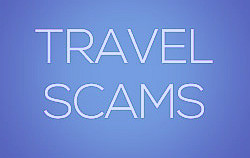 11/22/13/ Triad and the Plymouth Police Department received the following information from the Federal Trade Commission and felt the information was important to citizens in the community.
11/22/13/ Triad and the Plymouth Police Department received the following information from the Federal Trade Commission and felt the information was important to citizens in the community.
The holidays are drawing near and you’re thinking about how to get to grandma’s for Thanksgiving and your favorite uncle’s for Christmas; money for airfare may be a bit tight. But, just like that, you get a letter that sounds like you’ve lucked out in a big way. It’s an offer for free plane tickets to practically anyplace you want to go. The company — whose name appears to be that of a well-known airline — urges you to act quickly or you might miss this “last chance.” They even sent a “voucher” for the tickets.
Seems like all you have to do is call the toll-free number on the letter and you’ll soon be flying off to your desired destination. The offer has a deadline, though, so you’d better call now, right?
Wrong. Step away from the phone. It’s probably a scam — or the strings that are attached will tie you up in knots. Ask yourself these questions:
· What did I do to deserve this? It’s beyond improbable that you’ll get free airline tickets — or anything similar— out of the blue. Even if you entered a contest or sweepstakes, it’s unlikely that you’d get this kind of prize scot-free. The offer of something for nothing is a big red flag.
· What’s the rush? “Act now…” “Last chance …” ”We’ve been trying to reach you …” “Final attempt…” These are some of the phrases dishonest marketers and scam artists use to make you do something before thinking it though. Their object is to get you on the phone so they can pitch the urgency of their “offer.” Taking some time to think about it will spare you their fast talk — and possibly protect you from being ripped off.
· What’s the catch? While some of the best things in life may be free, the best material things typically cost money. For example, even if there’s a chance of free airline tickets, you probably will be required to sit through a marathon, high-pressure sales pitch to get you to join a travel club, buy a timeshare, or otherwise commit money, sooner or later. In other words, the offer is not so “free” after all. And if you see the term “certain restrictions,” assume many restrictions will apply.
· What’s that name again? Many scammers and dishonest marketers use names that sound very similar to legitimate airlines or other companies. Search the name of the company that sent you the letter to check on news articles or complaints. Check several sources: some companies flout the law even further by paying people to write fake endorsements.
Avoid getting swept away by flights of fantasy. Learn more about travel scams and file a complaint with the FTC if you’ve been tempted — or taken — by the promise of a free trip.
by Lisa Lake Consumer Education Specialist, FTC














